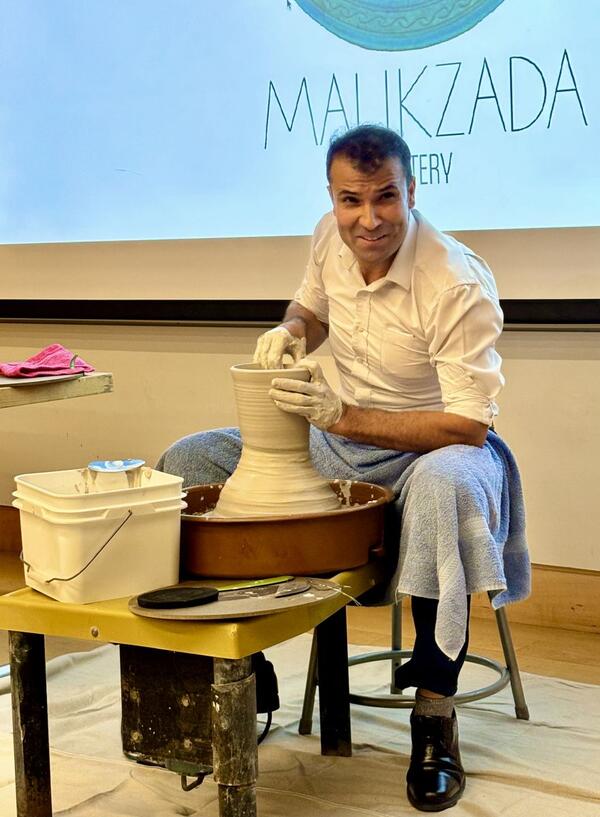Afghan Potter Shares Story of Artistry and Escape from Taliban to Connecticut

Afghan Potter Shares Story of Artistry and Escape from Taliban to Connecticut
Afghan Potter Shares Story of Artistry and Escape from Taliban to Connecticut
By FRANK RIZZO
When seventh-generation Afghan master potter Matin Malikzada fled country with his wife and four children after the Taliban had just retaken Kabul in August of 2021, he was uncertain where he and his family would eventually relocate — and what their future would be.
After the harrowing escape — which was aided by Turquoise Mountain, a not-for-profit international organization which supports artisans in troubled locations — Malikzada and his family first moved to Qatar, then to North Macedonia, then back to Qatar, then to the United State in Virginia. In March of 2022 Malikzada and his family finally resettled in New Milford in the northwest corner of Connecticut.
Malikzada, 39, told his compelling story — and demonstrated his artistry on a potter’s wheel — during a History of Art Department artist talk on Sept. 26 at the Loria Center. The event was sponsored by the Islamic Art Fund of the History of Art Department.
“It looks like every potter in Connecticut is here,” said Hayne Bayless, an award-winning American potter based in Essex, who attended the free event.
Attendees who filled the room listened as Malikzada described in detail his artisan heritage and his traditional pottery techniques and skills. He also spoke of his life in Istalif, a collection of villages about 35 miles north of Kabul, once a vibrant center of ceramic art and commerce.
Malikzada spoke of that region’s unique handmade turquoise glaze made from ishkar desert plants found only in northern Afghanistan, that when burned into ash and then mixed with metals, produce a black substance which, when fired, transforms pottery to a vibrant color.

In Kabul, Malikzada became a master if ceramics and ultimately became head of the ceramics department at the Turquoise Mountain Institute, which was founded in 2006 by former member of British Parliament Rory Stewart and King Charles III (then Prince Charles) in partnership with then-Afghan President Hamid Karzai, to support that country’s crafts industry.
Honed by the skills inherited from his father and grandfather — both of whom headed the local artisans’ guild in Istalif — Malikzada revitalized a nearly lost art of elegant symmetrical designs and turquoise glazes, training others in the ancient skillsets. His wife Najila draws many of the intricate, symmetrical designs of Malikzada’s pieces.
Malikzada also holds a bachelor’s degree in law from Kabul’s Tabesh University and a Certificates in Design and Crafts from the City and Guilds Institute of London.
He has also written books on Istalifi pottery and often demonstrated the ancient techniques internationally, including in India, Pakistan, Switzerland, Uzbekistan and at the Smithsonian Institution and Buckingham Palace.
Malikzada says that before the Taliban takeover of Afghanistan in August 2021, his life was relatively stable and productive.
Because of his affiliations with foreigners in his international travels over the years, Malikzada was viewed with suspicion by the Taliban. When it ascended to power in August in 2021, following the U.S. withdrawal from the country, Malikzada’s life became perilous and his escape from the country was facilitated by Turquoise Mountain.
After being vetted by Homeland Security, Malikzada and his family received support from New Milford Refugee Resettlement when they arrived in Connecticut. (Technically they are not “refugees,” but rather “humanitarian parolees.”) They are currently on the path of getting their Green Cards for permanent residency, and citizenship.
Malikzada says that he sees himself staying permanently in Connecticut. “It was a big challenge at first: the new language, the new culture, the new country — and financially. But I am happy now.”
Malikzada says that after more than a year here he now feels that he is part of the community of Connecticut potters, especially in Litchfield County. Local artists are eager to hear about his glazes and ancient techniques and he gives frequent classes in schools and arts centers in the region.

In October he was part of the Clay Way Studio Tour of potters in Western Connecticut. Malikzada’s work, functional as well as decorative, was also on display in October at the Kiara Matos Studio, 137 Orange St. in New Haven.
His work — as well as that of another Afghan artist Alibaba Awrang — are also on display in an exhibit “Uprooted: From Afghanistan to Connecticut” at the Mattatuck Museum in Waterbury through Jan. 7. The Mattatuck exhibit is co-curated with the Boston Museum of Fine Arts, and the Munson-Williams Proctor Arts Institute and is funded by the Art Bridges Foundation.
Malikzada says he is experimenting with completely different materials to achieve glazes of similar quality and appearance to those he used in Afghanistan, though he adds, nothing can duplicate the qualities of that unique native plant. Even though he is in an entirely new environment he remains focused on continuing his family’s traditional style and skills. “It’s very important to me,” he says. “I want to save my art.”
He happily notes that at least one of his two sons is interested in becoming the eighth generation master that will continue the family’s cultural artistry.
Malikzada’s website is malikzadapottery.com and can be reached at malikzadapottery@gmail.com.
